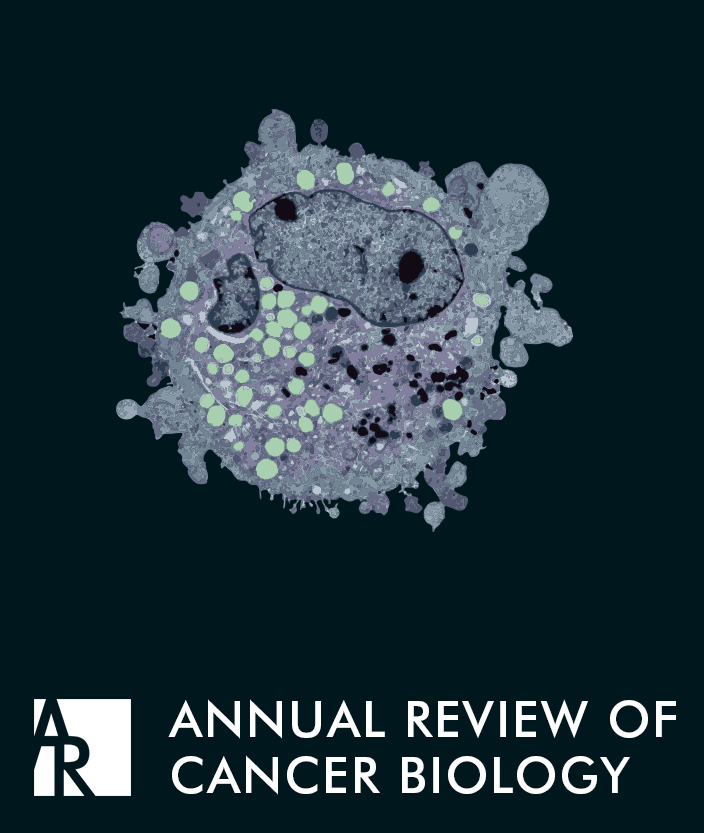免疫检查点阻断反应的生物标志物
IF 4.7
2区 医学
Q1 ONCOLOGY
Annual Review of Cancer Biology-Series
Pub Date : 2020-03-09
DOI:10.1146/annurev-cancerbio-030419-033604
引用次数: 24
摘要
免疫检查点阻断(ICB)在不同类型的癌症中具有显著的临床活性,即使在难治性晚期疾病中也能诱导持久缓解。然而,只有少数接受ICB治疗的癌症患者具有长期益处,ICB治疗与显著的、可能危及生命的自身免疫副作用相关。非常需要开发反应的生物标志物来指导患者的选择,以最大限度地提高获益机会并防止不必要的毒性,而目前的生物标记物并没有最佳的阳性或阴性预测价值。目前正在开发各种潜在的生物标志物,包括基于检查点蛋白表达的评估、肿瘤内在特征(包括突变负荷和病毒感染)的评估、对肿瘤免疫微环境特征(包括免疫细胞浸润的性质)的评估,以及宿主特征(如肠道微生物组的组成)的评估。更好地了解免疫反应和对ICB抵抗的潜在基本机制,以及使用互补的检测方法来询问肿瘤的不同特征、肿瘤微环境和宿主免疫系统,将使这些疗法能够更精确地用于优化患者的结果。本文章由计算机程序翻译,如有差异,请以英文原文为准。
Biomarkers for Response to Immune Checkpoint Blockade
Immune checkpoint blockade (ICB) has significant clinical activity in diverse cancer classes and can induce durable remissions in even refractory advanced disease. However, only a minority of cancer patients treated with ICB have long-term benefits, and ICB treatment is associated with significant, potentially life-threatening, autoimmune side effects. There is a great need to develop biomarkers of response to guide patient selection to maximize the chance of benefit and prevent unnecessary toxicity, and current biomarkers do not have optimal positive or negative predictive value. A variety of potential biomarkers are currently being developed, including those based on assessment of checkpoint protein expression, evaluation of tumor-intrinsic features including mutation burden and viral infection, evaluation of features of the tumor immune microenvironment including nature of immune cell infiltration, and features of the host such as composition of the gut microbiome. Better understanding of the underlying fundamental mechanisms of immune response and resistance to ICB, along with the use of complementary assays that interrogate distinct features of the tumor, the tumor microenvironment, and host immune system, will allow more precise use of these therapies to optimize patient outcomes.
求助全文
通过发布文献求助,成功后即可免费获取论文全文。
去求助
来源期刊

Annual Review of Cancer Biology-Series
Medicine-Oncology
CiteScore
14.50
自引率
1.30%
发文量
13
期刊介绍:
The Annual Review of Cancer Biology offers comprehensive reviews on various topics within cancer research, covering pivotal and emerging areas in the field. As our understanding of cancer's fundamental mechanisms deepens and more findings transition into targeted clinical treatments, the journal is structured around three main themes: Cancer Cell Biology, Tumorigenesis and Cancer Progression, and Translational Cancer Science. The current volume of this journal has transitioned from gated to open access through Annual Reviews' Subscribe to Open program, ensuring all articles are published under a CC BY license.
 求助内容:
求助内容: 应助结果提醒方式:
应助结果提醒方式:


